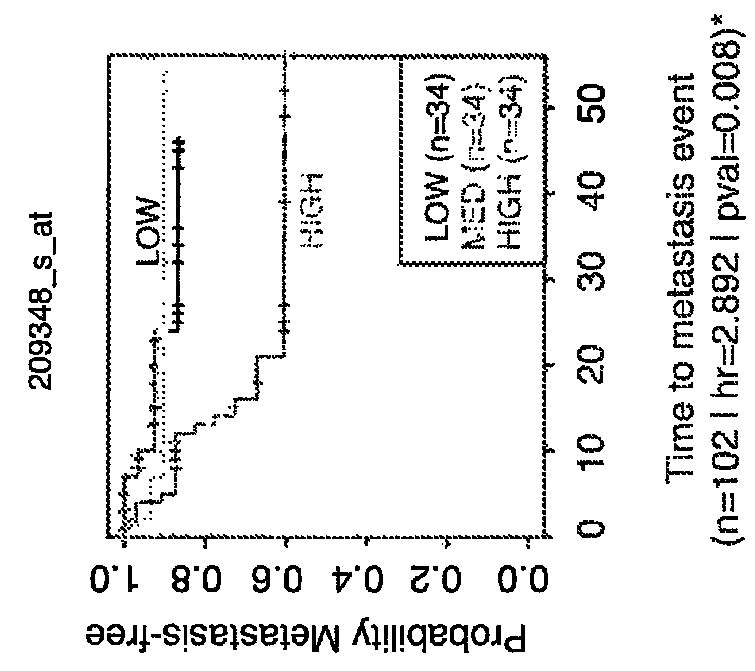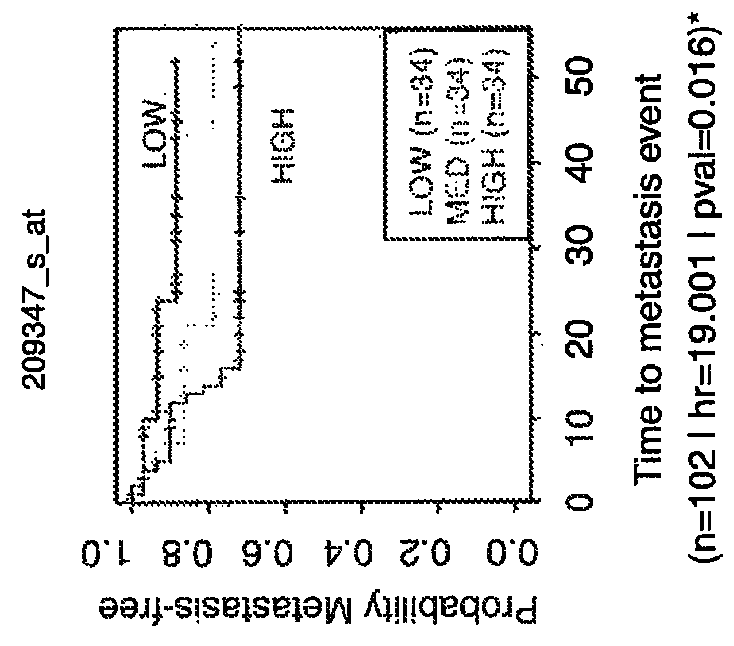Method for the diagnosis, prognosis and treatment of lung cancer metastasis
a technology for lung cancer and metastasis, applied in the field of lung cancer metastasis diagnosis, prognosis and treatment, can solve the problems of inactivation of tumor suppressor genes, failure to explain, loss of heterozygosity,
- Summary
- Abstract
- Description
- Claims
- Application Information
AI Technical Summary
Problems solved by technology
Method used
Image
Examples
example 1
Clinical Relevance and Prognostic Value of c-MAF and 16q22-24 to Identify Patients at Risk of Metastasis, in Particular Bone Metastasis
[0322]c-MAF was tested in different lung cancer patient sample cohorts. The first including gene expression profiles and clinical annotations for metastasis that contain the transcriptome of lung cancer primary tumors and a second cohort based on lung tumor biopsies in the form of a tissue microarray and the clinical annotations for time to bone metastasis and overall survival. These tumors are representative of all lung cancer subtypes and stages. In the first cohort, the expression of c-MAF gene is correlated with clinical parameters including time to metastasis. Similarly, the second set (n=74) of lung primary tumor biopsies for which the clinical annotation for bone relapse and overall survival post primary tumor diagnosis was used to determine, the levels of c-MAF protein expression and 16q23 genomic gain by immunohistochemistry and fluorescence...
example 2
c-MAF Gene Expression is Associated with Risk of Metastasis, in Particular Bone Metastasis, in Lung Cancer
[0330]Expression of c-MAF bone metastasis genes was correlated with clinical parameters including metastasis using the above described lung cancer expression data set. As described in FIG. 1, c-MAF expression was associated to high risk of metastasis. Following a standard statistical analysis we showed that MAF expression in these tumors significantly correlates with metastasis. A cohort of lung primary tumors, including EGFR and KRAS mutants and SCLC and NSCLC were used. All statistical analyses were performed using Bioconductor (Gentleman et al. (2004)).
[0331]The Cox Proportional Hazards Models were adjusted (using the R function coxph from Packaged survival) to see if we could explain metastasis phenotype through MAF expression. c-MAF had a statistically significant effect (Using three independent probes specific for c-MAF in affymetrix arrays). Gene expression of c-MAF in lu...
example 3
c-MAF Expression is Associated with Risk of Bone Metastasis
[0332]Immunohistochemistry Analysis
[0333]cMAF immunostaining was performed on plus charged glass slides in a Dako Link platform. After deparaffination, antigen retrieval was performed. Endogenous peroxidase is quenched. A anti-c-MAF antibody was used, followed by incubation with a secondary antibody coupled with preoxidase. C-MAF immunostaining is scored by a computerized measurement.
Prognostic and Predictive Value of c-MAF for Metastasis and Bone Metastasis in Lung Cancer
[0334]The prognostic and predictive value of c-MAF expression for metastasis of lung cancer was evaluated. C-MAF protein levels were determined by immunohistochemistry (IHC). MAF immunostaining was scored by a computerized measurement. Nine representative images from each specimen were acquired at 10-nm wavelength intervals between 420 and 700 nm, using a DM2000 Leica microscope equipped with the Nuance FX Multispectral Imaging System (CRI Inc). Before acqu...
PUM
| Property | Measurement | Unit |
|---|---|---|
| median survival time | aaaaa | aaaaa |
| time | aaaaa | aaaaa |
| time | aaaaa | aaaaa |
Abstract
Description
Claims
Application Information
 Login to View More
Login to View More - R&D
- Intellectual Property
- Life Sciences
- Materials
- Tech Scout
- Unparalleled Data Quality
- Higher Quality Content
- 60% Fewer Hallucinations
Browse by: Latest US Patents, China's latest patents, Technical Efficacy Thesaurus, Application Domain, Technology Topic, Popular Technical Reports.
© 2025 PatSnap. All rights reserved.Legal|Privacy policy|Modern Slavery Act Transparency Statement|Sitemap|About US| Contact US: help@patsnap.com



